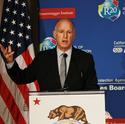Jet fighters, smart bombs, terrorism and ethnic cleansing have not exactly improved the Middle East. Yet the perennial world trouble spot is not without resources — an increasingly educated population, massive energy resources and ample capital — but still suffers economically, with the world’s worst unemployment rates. read more »
Economics
The Middle East Could Use Less Warfare and More Capitalism
- Login to post comments
In California, the “Jungle” Is Predictable
One doesn’t expect the unexpected in California elections. A progressive Democrat will become governor; Dianne Feinstein will return to the Senate yet again; and so on. Nuances still matter, particularly at the congressional level, in part due to the “jungle primary” system, but nothing much has changed. Statewide, the ideological die, at least for now, is cast. read more »
6 Forces Disrupting Higher Education
Universities and health care, “eds and meds”, have been in a huge growth cycle over the last few decades. Many communities have been pinning their hopes on anchor institutions like a university or research hospital to retool their economies for the 21st century.
Yet the higher education industry is facing a convergence of several trends and forces that are threaten their future. At a minimum, schools need to be figuring out how to navigate these choppy waters ahead. read more »
Brownout
Jerry Brown’s long political career will likely end in January 2019, when the 80-year-old’s second stint as California governor concludes. In the media’s eyes—and in his own mind—Brown’s gubernatorial encore has been a rousing success. read more »
- Login to post comments
The Fight for Our Future Belongs to the ’Burbs
Look away from President Trump and it’s easier to see how three long-term demographic and geographic trends are reshaping American politics. read more »
- Login to post comments
French President Takes on Socialized Trains
They say Millennials are rejecting capitalism and are drawn to socialism. It’s hard to imagine why, as nearly all the problems they face are caused by bad government policies, not selfish entrepreneurs. read more »
- Login to post comments
The Cities Creating The Most White-Collar Jobs, 2018
Professional and business services have long been identified with the downtowns of cities like New York, Chicago and San Francisco, where lawyers, accountants and architects are thick on the ground. However, in recent years there's been a clear shift in the geography of this vital sector, with some of the strongest job generation emerging far from the high-rise canyons. This shift is of profound importance given that professional and business services is by far the largest high-wage job sector in the U.S. read more »
- Login to post comments
More on Bifurcating Chicago and Detroit
(Note: this past Sunday I wrote a 20-tweet (!), 657-word (!!) tweetstorm that was largely a response to some things from about a month ago. Yeah, I can hold onto a grudge. Anyway, here I'm offering an expanded version of the content from that tweetstorm, but also some elaborations that can provide more clarity and nuance. -Pete) read more »
- Login to post comments
Trump’s Opposition To Unrestricted Globalism Might Prove a Historical Necessity
Let’s stipulate that Donald Trump is a vulgar, ignorant and often reckless narcissist. Yet he also may well prove a historical necessity, someone who, intentionally or not, has rendered apart a bi-partisan consensus well past its usefulness. read more »
- Login to post comments
The Arab Tradition of Enterprise
In the 1940s, American oil workers in Saudi Arabia stumbled across ruins in the desert. They had found Qaryat al-Fāw, a pre-Islamic city located deep in the deserts of the Arabian Peninsula. When the sand was dug up, the remains of a trading hub bustling with houses, squares, and a large marketplace was discovered. Centuries before the birth of Islam, caravans carrying textiles, minerals, and grains across Arabia had passed through the city. Its inhabitants had worked in trade and agriculture, and relied on seventeen local wells for water. read more »
- Login to post comments






















